Five years on - Red Bull's first win remembered
It is easy to forget, given the incredible level of success Red Bull have recorded in recent seasons, that the team's breakthrough win came just five years ago in China. On the eve of this year's Shanghai race, we look back on that momentous victory - and the phenomenal achievements that have followed…
Red Bull's crew bouncing in celebration; Christian Horner's jubilant post-race messages; the triumphant pointed finger of Sebastian Vettel - such things have become commonplace in Formula One racing in recent seasons. But it was just five years ago that they were experienced for the first time, as Vettel and Mark Webber dominated proceedings on a drenched Shanghai track. Even then, few could have predicted what would come to pass in the years that followed.
Seven teams have won since Red Bull's first triumph (which, somewhat embarrassingly, happened after Vettel had taken sister team Toro Rosso to victory in 2008): McLaren have taken 20 victories, Ferrari 12, while Mercedes, Brawn, Lotus and Williams' respective win counts are in single figures. But all have been utterly eclipsed by the Anglo-Austrian team from Milton Keynes.
In the same period - 94 races - Red Bull have racked up 46 further wins, 57 pole positions, and a remarkable 100 podiums. Winless five seasons ago, Dietrich Mateschitz's squad now sit in fifth place on the all-time win list for constructors, having vaulted ahead of iconic marques like Brabham, Renault, Benetton and Tyrrell.
Shanghai 2009 was the launch pad for such a remarkable run.
It had begun in low key fashion, with Vettel - entering his third race with the team - and Webber both struggling with mechanical gremlins during practice. In the final session both men languished outside the top 14.
Vettel was restricted to solitary runs in Q1, Q2 and Q3, but still defied the odds to capture the team's first pole - an "unbelievable" moment, he later reflected. Webber meanwhile secured third, less than a tenth of a second behind Fernando Alonso's Renault.
The heavens opened on race day, and in the treacherous conditions the Red Bulls took command - at least once the safety car had pulled in after leading the field out for the first eight laps.
Alonso had qualified on a minimum fuel load, and hence had to pit early, allowing Vettel and Webber to cruise away from a chasing pack led by the Brawns of Jenson Button and Rubens Barrichello. By the time of his first stop, Vettel had opened a six-second cushion over Webber, and a 14-second gap to Button.
The Brawns were fuelled longer than the Red Bulls, but did not have the pace to capitalise even when the safety car re-emerged on lap 18 after BMW Sauber's Robert Kubica rode up the back of Jarno Trulli's Toyota. But even with a comfortable pace advantage, there were scares for Vettel. During the extended caution period the yet-to-stop Sebastien Buemi tagged the rear of Vettel's car. The Swiss driver needed a new wing, but Vettel survived the skirmish.
It would be the last time Vettel's claim to victory was put in serious jeopardy. Under race conditions his rivals had no answer to the German's superior speed: he pulled out a near-five-second gap to his nearest challenger on the first lap under green flags alone, and proceeded to extend that gap at will as he strolled away at the front.
Things were less serene for Webber, who fell behind Button during the pit stops. The Australian fought his way back through when the Briton - winner of the opening two Grands Prix of the season - made a mistake at the hairpin on lap 28, but then ceded position with his own mistake three laps later. He needed less than a lap to surge back in front with an exceptional move around the outside of Turn 7. It would prove to be the decisive pass in the pair's battle.
Vettel made his final stop before Button's and rejoined on the Briton's tail. Victory was therefore all but assured, but Vettel illustrated his team's supremacy with a flourish, out-braking Button at the hairpin to reclaim the lead 16 laps from the finish.
Button pitted shortly after, promoting Webber back to second and leaving the Red Bulls free to take a commanding, and deserved, one-two.
Vettel had a ten-second gap to Webber at the flag and a 44-second margin over Button. No one else was within a minute of the runaway German.
"The car was fantastic," Vettel beamed afterwards. "We were struggling a bit with reliability, but we fixed it overnight. That speaks of the quality of our team. Having a double win for Red Bull is incredible."
Button admitted that Brawn - who had drawn Red Bull's ire with their controversial and speed-boosting double diffuser device - hadn't been able to answer the Milton Keynes squad's pace, while team principal Christian Horner warned that the victory would fire his team to greater heights. His words become more ominous when viewed through the prism of the past four seasons.
"It's a breakthrough result for us," Horner exclaimed. "It's a long season ahead, and we can see that we're competitive with both drivers. I think the sky's the limit."
Such words would prove prophetic. Vettel won three more times that season - in Britain, Japan and the season-ending race in Abu Dhabi - to claim second in the drivers' championship. Amazingly, that remains his worst season, and his lowest finish in the championship, while racing for Red Bull.
For Vettel and Red Bull the only way has been up, with four consecutive drivers' and constructors' championship crowns etched neatly in the record books. Hard to fathom, then, that just five years ago in China, the team was chasing its maiden win.
Next Up
Related Articles
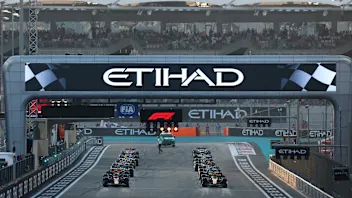 This Week in F110 quiz questions on the Abu Dhabi title decider
This Week in F110 quiz questions on the Abu Dhabi title decider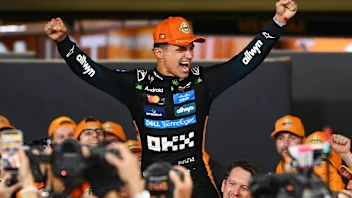 All the key stats from Norris’ title-winning season
All the key stats from Norris’ title-winning season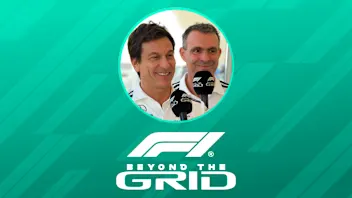 Beyond The GridToto Wolff and Hywel Thomas on Mercedes’ 2026 prospects
Beyond The GridToto Wolff and Hywel Thomas on Mercedes’ 2026 prospects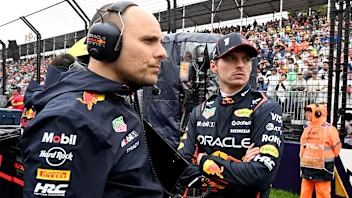 Verstappen pays tribute to Lambiase after ‘emotional year’
Verstappen pays tribute to Lambiase after ‘emotional year’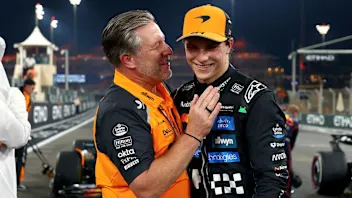 Piastri ‘should be proud’ of his season says Brown
Piastri ‘should be proud’ of his season says Brown Sainz hopes point-less finish in Abu Dhabi ‘serves as a wake-up call’
Sainz hopes point-less finish in Abu Dhabi ‘serves as a wake-up call’